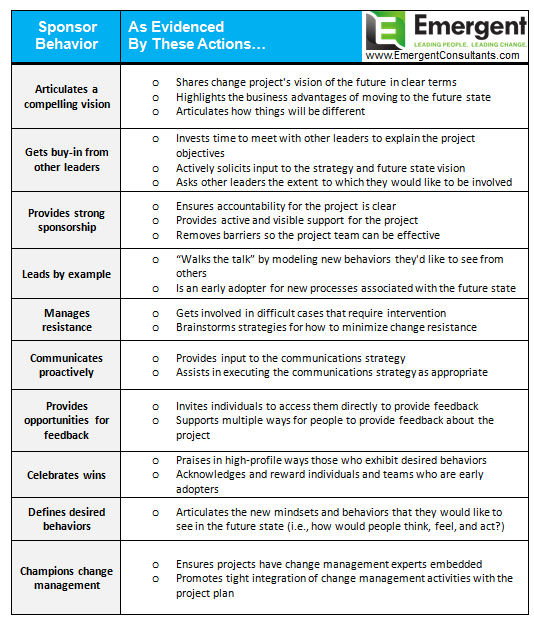
 As discussed in Secrets to Business Transformation Success, successful projects are characterized by six things: a well-defined governance structure, strong sense of urgency, active sponsorship from leaders, engagement across all organizational levels, alignment with the organization’s existing systems and structures, and strategies for sustaining changes over the long term.
As discussed in Secrets to Business Transformation Success, successful projects are characterized by six things: a well-defined governance structure, strong sense of urgency, active sponsorship from leaders, engagement across all organizational levels, alignment with the organization’s existing systems and structures, and strategies for sustaining changes over the long term.
Of these six characteristics, sponsorship is one of the most fundamental factors and the one that correlates most directly with a project’s success or failure. Below is a summary of the behaviors that highly effective sponsors exhibit, along with examples of specific actions to look for.

Effective sponsors should be actively engaged in the project from start to finish. They should constantly explain and champion the initiative up, down, and across the organization to ensure that all stakeholders understand and commit to the vision for change.
The sponsor should lead the decision process through the inevitable conflicts that arise when preferences among business units conflict with one another and with what is best for the company as a whole.
Effective sponsors should take full advantage of outside experience and points of view. The chances of project success increase dramatically when internal and external experts work together considering different approaches before arriving at a decision.
Sponsors should understand that courage is required for project leaders to drive real change. Without strong leadership, project teams often avoid bold decisions and gravitate toward lower level incremental change. Sponsors need to remind their teams that they are expected to make the hard decisions necessary to achieve strategic value.
If you would like to assess the effectiveness of your project’s sponsorship, check out Change Accelerator’s Executive Sponsorship Assessment tool.











